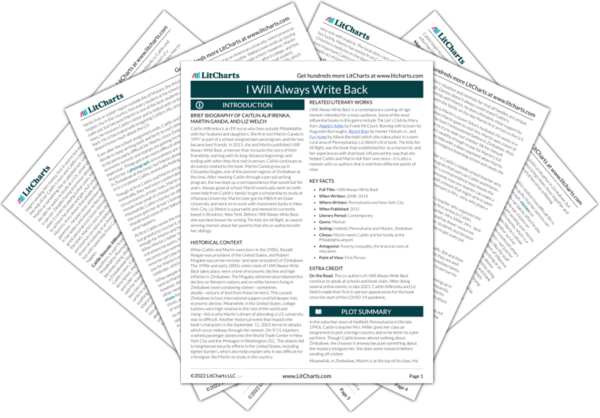At the center of I Will Always Write Back is the friendship between Caitlin and Martin, which spans continents and develops over the course of years. This friendship has unexpected benefits, enriching not only their own lives, but also their family and community members’ lives. Caitlin and Martin’s relationship begins as something unexceptional: an exchange of pleasantries in letters written for a school assignment. At first, they know little about each other beyond stereotypes. Caitlin has never even heard of Zimbabwe and incorrectly assumes that Martin and his family live just like the Black people she’s met in Pennsylvania—she knows nothing of the political and economic instability in the country at the time (the late 1990s). Likewise, Martin simply imagines the U.S. as the land of Coca-Cola and Hulk Hogan. He has rarely seen white people in real life, and even in his imagination, he can’t picture a family as wealthy as Caitlin’s. But as the two continue writing to each other long after the assignment ends, their relationship deepens, and they feel comfortable sharing more personal details about their lives.
Both friends learn surprising things about each other: for example, Caitlin can’t believe that Martin’s family lives in such a small house, and Martin can’t believe that Caitlin treats a pet rabbit like a member of her family. Despite these big differences, however, they also find that they have surprising things in common: they both like the Spice Girls and Nike shoes, for example. This shows that even people on opposite sides of the world, from vastly different economic situations can find common ground and enjoy similar things. Their friendship also helps both Caitlin, Martin, and their respective families and communities come to better understand the world outside of their own immediate surroundings. Moreover, their friendship is what leads Caitlin’s family to help Martin survive hardships and realize his dream of attending an American university. Some people around them, like Caitlin’s friend Lauren, think that Caitlin and Martin’s relationship only makes sense if it’s romantic. As Caitlin and Martin demonstrate in their letters, however, not all deep relationships are necessarily romantic. The co-authors of I Will Always Write Back show that cultivating friendships can be mutually beneficial, helping people become more open-minded, express their feelings, and discover and achieve their life goals. Their book demonstrates that even people who lead very different lives and/or live far apart can form meaningful relationships, so long as they’re committed to understanding and supporting each other.
Friendship ThemeTracker

Friendship Quotes in I Will Always Write Back
When I unfolded the letter, a small snapshot fell onto my desk.
I could not believe my pen pal would send me something so precious. Photos are very rare and quite expensive in Zimbabwe.
The next line really cracked me up: Have you heard the one from Spicy Girls, which says friendship never ends?
I laughed out loud when he called them “Spicy,” and hoped that the line would be our motto.
It was strange, because even though we had never met, Martin was the only person I felt I could be totally honest with. I never worried that he would judge or tease. On the contrary, I could tell Martin whatever was happening in my life, knowing he’d always take my side, no matter what.
I continued to check the mail every single day for weeks. And then one day, I saw an envelope so completely covered with stamps it barely had space for my name and address. Martin was alive! I ripped it open, thrilled. But when I unfolded the actual letter, I gasped. My friend was writing to me on trash.
Reading that letter brought tears to my eyes. He was so proud. He had never asked me for help. Asking my parents for help was probably one of the hardest things for him to have to do. He did not want to burden me. He knew that I would get sick worrying about him in such need. But there it was, written on paper, a huge SOS. My parents knew I had a pen pal in Zimbabwe, but they did not know how close we had become. That evening, I decided to tell them everything. It was the only way I could truly help Martin.
Thanks to Caitlin, we ate chicken for Christmas that year, a miracle considering what our friends and neighbors were experiencing. In Zimbabwe, if you have food, you share it, so our neighbors ate chicken with us.
The first line of the email was like rocket fuel:
We are pleased to offer you a full scholarship beginning with the 2003-2004 academic year.
It propelled me from my seat. The breath I’d been holding for the past few months came barreling out of my mouth as I shouted, “Yesssssss!”
I felt Caitlin squeeze my hand, and I squeezed back. After six years of imagining what it would be like to see her, to hug her, to hear her laugh, to hold her hand, here she was, my best friend from afar, now standing right next to me.
Watching him exchange vows with Caitlin earlier that day, I got a bit choked up. Caitlin and I had already shared so many milestones—and still have many ahead. I did not know then that I would go on to do my MBA at Duke, or that Caitlin would finish her nursing degree, as she had planned since she was sixteen or give birth to a beautiful baby girl. All I knew was that we both had witnessed so many of each other’s dreams come true.
I have no idea what any of these young people will do with the emotions our story stirred in each of them—but I am excited by the possibilities. It’s why I wanted to write this book.
Kindness is contagious. It changes lives. It changed mine. What will it do for you?











